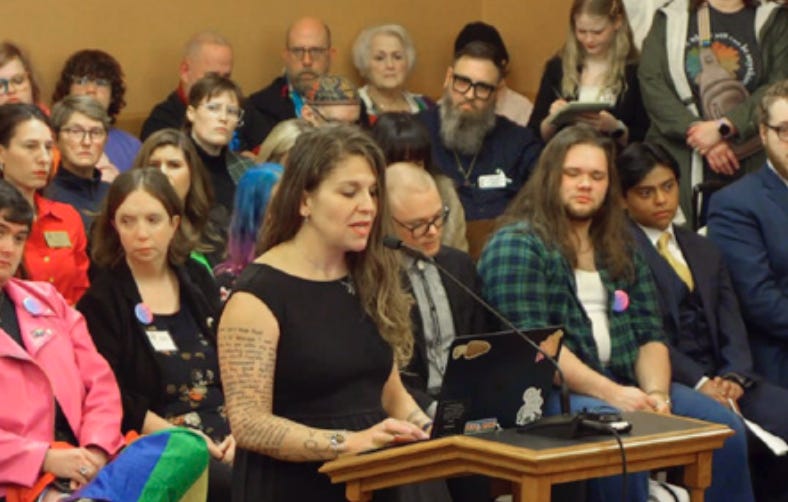The Hit Job
The NY Times podcast “The Protocol” episode 4
So, suppose you were the NY Times editorial team and you were releasing a podcast series a few weeks before the anticipated Skrmetti ruling from the Supreme Court. Your aim was to prepare readers for the ruling. (I wrote most of this post before the ruling dropped, today, June 18th. As widely expected, SCOTUS upheld Tennessee’s ban on puberty-blocking drugs, cross-sex hormones, and surgeries for the purpose of treating conditions known variously as gender dysphoria, gender identity disorder, or gender incongruence.)
Let’s get one thing straight. No state – no one at all -- wants to ban “care.” That would be cruel and incomprehensible. Those who want to ban pediatric gender medicine want it banned precisely because they have studied the evidence and decided that it is not “care” but harm. They want to ban a particular kind of harm. Distressed kids do of course need and deserve care. Real care. Not “gender affirming care.” Which - as many of us believe - is harm.
But you are the NY Times editorial team and you are convinced that pediatric gender medicine is care. What is more, many of your fellow workers identify as transgender and others have trans-identifying kids. You don’t want to rock the boat. However, it does seem that some people have been prescribing this care a little too, enthusiastically, if you will. And the voters don’t seem to like it. Maybe a tiny course correction is necessary. So, what you decide to do is to present extremes at either end of the debate so that your readers can find a comfortable place in the middle from which to oppose the bans.
You start by spending two episodes on the Dutch clinicians’ version of the Dutch Protocol - oh so scrupulous and cautious. You aren’t aware, or don’t care, that this is all rubbish. The Dutch are experts at patting themselves on the back - it’s a national trait. (I am Dutch.) Listen to the interview with Thomas Steensma and Annelou De Vries in “Gender: A Wider Lens” (#66) and other episodes such as Stella O’Malley and Sasha Ayad’s later analysis of it (#173) for more insight into the Dutch clinicians’ complacency and batshit methodology.
In the first two episodes of “The Protocol,” we met FG and Maud, both homosexual, who are happy with their “transition” because people see them as the opposite sex. That was what they wanted. The absence of intimate relationships is clear but not mentioned. Feelings of shame and aggression are hinted at but not explored. The subject of the physical consequences of the medical and surgical interventions is avoided.
Then we get episode 3, which contrasts the big baddie Johanna Olson-Kennedy with the moderate Laura Edwards-Leeper. Olson-Kennedy, who operates a client-led, child-led model, prescribing drugs and surgery to every kid who wants it, is certainly one of the villains in this story. And she is the perfect fall guy. She is being sued, she has recently been shown to have suppressed evidence - and look! Her clinic has been forced to close. She clearly went too far.
The cautious middle is represented by Laura Edwards-Leeper, who wanted to follow the cautious Dutch. I have already shown in earlier posts how false these characterizations are. Edwards-Leeper is not a moderate. She thinks it’s fine to prescribe puberty blockers and hormones to proto-gay and other “gender non-conforming” kids. But Austin Elliot and Azeen Ghorayshi have cast her in the role of the moderate.
So, who will represent the regrettable extreme at the other end of the scale? Someone who wants to ban pediatric gender medicine altogether. Let’s follow my theoretical reconstruction of the journalists’ thought processes. On the one hand, it would be good to choose one of those reactionary Evangelical types. Hmm, but those wavering on gender affirming care would never listen to those voices anyway. Let’s go for one who has been more influential on the left. After all, you even see new Democrats like DIAG making a fuss. Readers need to be reassured that these people calling themselves “liberals” are wrong.
“I know - let’s choose Jamie Reed!”
To refresh readers’ memories: Jamie Reed has a master’s in Clinical Research Management from Washington University, St. Louis, and worked for four years (2018-2022) as a case manager at the Washington University Transgender Center at St Louis Children’s Hospital. The shocking malpractice she encountered there, and the directors’ dismissal of her concerns, prompted her to blow the whistle on the clinic’s mismanagement of the patient population, and on “gender affirming care” in general. The extraordinary affidavit she submitted to the Attorney-General of Missouri played a major role in precipitating the closure of the clinic – and the state’s other gender clinics. Since then, she has traveled the country, testifying in state after state in support of bans on pediatric gender medicine.
You can hear the journalists thinking: “But wait: it would not be great to interview her now. So much has happened since then. We’d have to deal with the nasty details about WPATH – all those pesky disclosures and arguments in the amicus curiae briefs from groups such as WDI International USA and the Attorney General of Alabama in the Skrmetti case. We might have to deal with that scandal about the Biden Administration pressuring WPATH to scrap minimum age limits. And all those systematic reviews. And – eek! now the Dept. of HHS has published a 400-page review of treatment of gender dysphoric children that even got a favorable Op-Ed writeup in the Washington Post. And then there is Jamie’s ex-spouse Tiger – who then identified as a trans man and has since detransitioned. That’s kind of awkward. It might start to look as if Jamie is right. Can’t have that. Let’s use the interview we did in 2023! It will save money - and we won’t have to deal with all that tricky stuff. And we can focus on the angry parents - oh yes, the angry parents!”
Episode 4 provides the clearest example of why discussions of youth gender medicine in the United States go awry. They are caught up in - or intentionally steered into - a whirlwind of politics and religion, with crazed parents in the spotlight. The person with real expertise and experience in the field -- Jamie Reed -- buffeted by these forces, tries to steer an even, thoughtful path. The journos Austin Elliott and Azeen Ghorayshi create so much noise it’s hard to hear what she is saying.
Please stop now if you can and read her affidavit before listening to episode 4.
https://ago.mo.gov/wp-content/uploads/2-07-2023-reed-affidavit-signed.pdf
Austin Elliott is a caricatural tribal “liberal” who thinks gender medicine is about politics rather than evidence-based medicine. When Jamie Reed explains that medicine is not about “patient satisfaction,” he asks her, baffled, what else it should be about. Instead of looking at the details of Jamie’s testimony (did he read the affidavit?), he tells listeners that parents happy with their children’s treatment say she was exploited by the far right. Describing the courtroom, he dwells on a couple of signs representing religious extremists, as if to suggest religious mania is what motivates the opponents of pediatric gender medicine. He describes opponents with a broad brush as “conservatives.” It is transparent and despicable.
Azeen Ghorayshi is a caricatural example of the journalist drawn to high drama and intense emotion rather than cogent analysis.
Together they do a hit job on the whistleblower Jamie Reed.
The affidavit may make you weep - it is nothing short of stunning. None of it has ever been disproven. Oh wait - there is a small error in this 23-page catalog of horrors. In a single case, Jamie unfortunately relied on hearsay (from a nurse) for a quote from a parent of a child who suffered liver damage. The liver damage is not disputed but the mother says she didn’t say what the nurse said. So, the NY Times zeroes in on this minor error -- and the mother’s (not entirely comprehensible) fury about it -- in a clear attempt to get readers, and listeners, to question the entire affidavit. This is activist journalism at its most disreputable.
Two things merit special attention. First, the podcast doesn’t mention any of Jamie’s examples except for the disputed one. General points are made early in the podcast about the failure to address mental health issues, the lack of informed consent, and the suppression of concerns. But as anyone who has ever given a talk knows, general points never stick in people’s minds without examples. That is why I urge you to read the affidavit. People need and deserve examples, in order to fully appreciate Jamie Reed’s concerns. Here are a few:
Then we hear from the parents who are furious about Jamie Reed’s whistleblowing. They are from a parents’ group linked to the hospital – in other words, strong supporters of the interventions. They accuse her of being a tool of the far right -- a ludicrous accusation, given her clear status as a lifelong progressive -- and of jeopardizing their children’s care, which has been “life-saving.”
Of course they will say that. They have to! Helen Joyce has described the position of such parents in her trademark unflinching style: they are the last people who will ever accept that pediatric gender medicine causes harm:
Jamie Reed makes exactly the same point in the podcast in somewhat milder terms but the journalists seem not to comprehend it. They present the views of the parents who support the clinic – with a special spot for the angry mother with the single disputed quote -- in a clear bid to plant doubt in listeners’ minds as to the veracity of Jamie Reed’s claims.
The Supreme Court ruled 6-3 along ideological lines in Skrmetti. The truth is that Jamie Reed – not by any stretch of the imagination a conservative -- is the adult in the room with the expertise and courage to inform the public and to help them to understand and accept the ruling. But the activist journalists at the New York Times – like the three dissenting justices -- are neither willing nor able to see it.





Thank you for explaining The Protocol’s journalistic malpractice so clearly, Bev.
And thank you for getting me to go read Jamie’s affidavit from beginning to end (it’s not that long, I hope everyone will).
Excellent analysis. I have restacked, and agree that everyone should read the affidavit. Jamie Reed is a true hero.